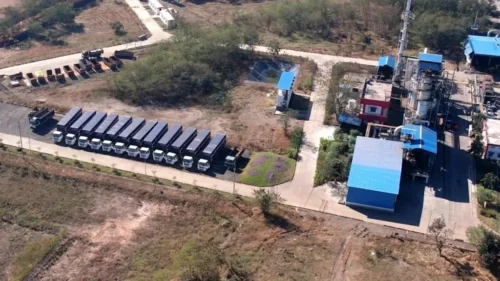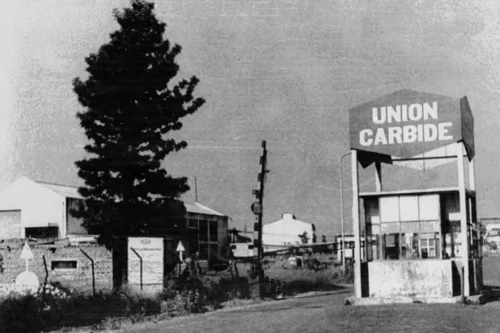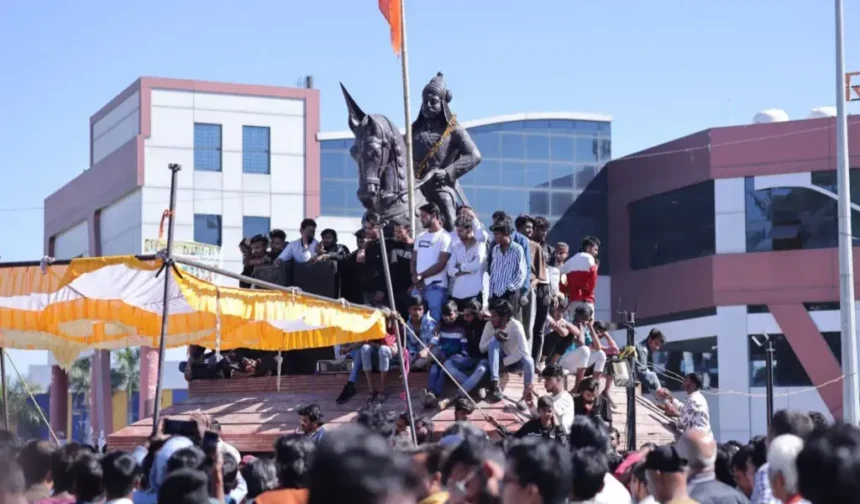In Madhya Pradesh, the central Indian state, Shivnarayan Dasana, a vegetable vendor, had never witnessed such many police officers arrive at his village.
The 60-year-old lives in Tarapur, an industrial village in Pithampur renowned for its pharmaceutical and automobile factories. Three weeks ago, containers containing 337 tonnes of toxic waste arrived at the site of one of the world’s most catastrophic industrial catastrophes for disposal, causing tension in the town.
Waste transported from the former Union Carbide factory in Bhopal, India—the location of the tragic 1984 gas disaster that resulted in countless fatalities—has sparked concerns among residents.
They are concerned that the disposal of the material near their residences could be detrimental and potentially result in an environmental catastrophe.
A day after the refuse arrived in the town, protests erupted on 3 January, culminating in attempted self-immolations and stone-throwing.
Since then, the disposal facility has been the focal point of intense police surveillance, transforming Tarapur and its environs into a virtual garrison.
The townspeople continue to express their apprehensions regarding industrial pollution at smaller community meetings even though the authorities have registered seven cases against 100 individuals since the protests commenced.

The toxic waste removed from the India Bhopal factory included five categories of hazardous materials, including pesticide residue and “forever chemicals” leftover from manufacturing. These chemicals are so named because they indefinitely retain toxic properties.
Over the decades, the infiltration of these chemicals into the adjacent environment has jeopardized the health of the residents of the Bhopal area codes.
However, officials have dismissed concerns regarding the potential environmental consequences of the refuse disposal in Pithampur.
Senior official Swatantra Kumar Singh delineated the staggered process to assuage the public.
“Hazardous waste will be incinerated at 1,200C (2,192F), with 90kg (194.4lb) test batches followed by 270kg batches over three months if toxicity levels are safe,” according to him.
Mr Singh clarified that a “four-layer filtering” will purify smoke, preventing pollutants from entering the air. The residue from incineration will be “sealed in a two-layer membrane” and “buried in a specialized landfill” to prevent soil and groundwater contamination.
Administrator Priyank Mishra stated, “We have trained 100’master trainers’ and are currently conducting sessions to elucidate the disposal process and foster public trust.”
Mohan Yadav, the Chief Minister of Madhya Pradesh, has defended the waste disposal process, stating that it is secure and necessary. He encouraged residents to express their concerns legally, pointing out that the disposal was only conducted under orders from the high court.
Nevertheless, the process is the subject of disagreement among environmental experts.
Some, such as Subhash C Pandey, believe disposal is entirely risk-free. Many, including Shyamala Mani, advocate for alternatives to incineration. She contends that incineration discharges harmful toxins such as mercury and dioxins and accumulates residual slag.
Ms Mani proposes that bioremediation, which employs microorganisms to degrade harmful substances in waste, may be a more environmentally friendly and effective solution.
However, residents continue to harbour reservations.
“It is not merely a waste.” Gayatri Tiwari, a mother of five in Tarapur village, declared, “It is poison.” “What’s the point of life if we can’t breathe clean air or drink clean water?”
The residents of Pithampur are confronted with an undeniable reality: pollution. Residents attribute their scepticism to ongoing health issues and past groundwater contamination.
In the 1980s, the town’s swift industrial growth led to a buildup of hazardous waste and contaminated water and soil with mercury, arsenic, and sulfates. By 2017, the Central Pollution Control Bureau, a federal agency, had recognized significant pollution in the area.
According to residents, numerous organizations disregard regulations regarding the disposal of non-hazardous refuse, opting to deposit it in the soil or water. In 2024, hazardous substances were detected in water at an elevated level. Activists have associated this with purported environmental violations at the disposal facility; however, officials have refuted this claim.

“Water filters in our homes don’t last just two months.” Skin diseases and kidney stones are increasingly common today. Pankaj Patel, 32, from Chirakhan village, remarked, “Pollution has made life unbearable.” He indicated that his water purifier required regular replacements.
Mr Srinivas Dwivedi, the regional officer of the State Pollution Control Board, disregarded any apprehensions, asserting that it is “unrealistic” to anticipate pre-industrial conditions in Pithampur.
Activists in Bhopal, nearly 230km (143 miles) from Pithampur, contend that the disposal process diverts attention from significant issues.
The toxic material was left in the mothballed factory for decades after the catastrophe, contaminating the groundwater in the surrounding areas.
According to a 2010 report by the National Environmental Engineering Research Institute and the National Geophysical Research Institute, the Union Carbide factory site currently contains over 1.1 million tonnes of contaminated soil.
“The government is making a spectacle of disposing of 337 metric tonnes while disregarding the much more significant issue in Bhopal,” stated Nityanand Jayaraman, a prominent environmentalist.
“The government has done little to address the contamination, despite the fact that it has worsened over the years,” added Rachna Dhingra, another activist.
According to government estimates, 3,500 individuals passed away immediately after the gas leak, and an additional 15,000 individuals died later. Activists assert that the death toll is significantly higher, as victims are still experiencing the adverse effects of the poisoning.
“The residents’ concerns are legitimate, given Pithampur’s history of pollution,” stated Mr. Jayaraman.
Officials stated they are exclusively “addressing the waste per the court’s directive.”
However, the people of Pithampur are now prepared to take to the streets once more to oppose the refuse disposal, as the reality of Bhopal has further exacerbated the mistrust among them.
Shivnarayan Dasana, a vegetable vendor, stated that the problem extends beyond the refuse.
“It’s about survival – ours and our children’s,” he indicated.

Salman Ahmad is known for his significant contributions to esteemed publications like the Times of India and the Express Tribune. Salman has carved a niche as a freelance journalist, combining thorough research with engaging reporting.














